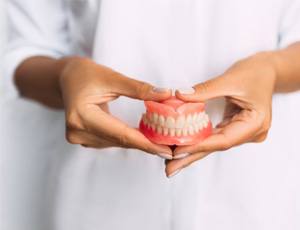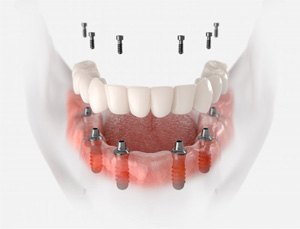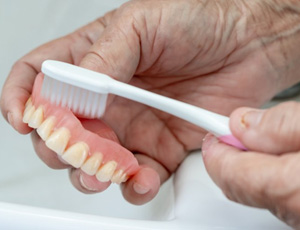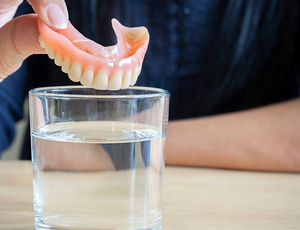Dentures and Partial Dentures – Harrisburg, PA
Restore Your Smile’s Beauty and Function
 If you are missing several teeth
— or all of your teeth — you may find it difficult to speak clearly and eat comfortably. You are
also at an increased risk of significant oral and overall health problems. Dentures and partial dentures in
Harrisburg offer a reliable and aesthetically pleasing way to treat extensive tooth loss and protect your
long-term well-being.
If you are missing several teeth
— or all of your teeth — you may find it difficult to speak clearly and eat comfortably. You are
also at an increased risk of significant oral and overall health problems. Dentures and partial dentures in
Harrisburg offer a reliable and aesthetically pleasing way to treat extensive tooth loss and protect your
long-term well-being.
What Are Dentures?
 A denture is a custom-made
prosthetic that is designed to replace teeth in either the upper or lower jaw. It consists of artificial teeth
(made of acrylic or porcelain) that are attached to a gum-colored base. A metal frame or other attachments may
provide a denture with extra sturdiness.
A denture is a custom-made
prosthetic that is designed to replace teeth in either the upper or lower jaw. It consists of artificial teeth
(made of acrylic or porcelain) that are attached to a gum-colored base. A metal frame or other attachments may
provide a denture with extra sturdiness.
Candidates for Dentures

The vast majority of people who have lost a significant number of teeth are candidates for dentures. If your gums are healthy enough to support a prosthetic, either a full or partial one may be the ideal way to restore your smile. If you would like to receive an implant-retained denture, you should have fair oral and overall health and adequate bone density to support the implants. Read on to learn what makes an ideal patient for dentures.
Effects of Missing Teeth

There are various reasons why someone can lose their teeth. The most common ones involve tooth decay, periodontal disease, and accidental physical trauma. Regardless of how you’ve come to struggle with missing teeth, it’s extremely important to consider the consequences of it. Tooth loss typically comes with a wide range of challenges to your normal oral habits, including eating properly, difficulty speaking, jawbone deterioration, facial sagging, and reduced self-esteem. That’s why it’s crucial to visit our team about tooth-replacement solutions for replacing your lost pearly whites, such as dentures.
- Direct bonding is a fast and relatively low-priced service that uses a tooth-colored resin to disguise aesthetic flaws in teeth. Its biggest downside is that it usually lasts just a few years.
- Teeth whitening uses a powerful bleaching formula to break up unwanted pigment molecules in teeth, leading to a brighter overall smile. It usually costs just a few hundred dollars, and the results can last for anywhere from a few months to a few years.
- Veneers are sometimes regarded as an “all-in-one” cosmetic treatment because they can hide discoloration, chips, cracks, minor misalignment, and more. They can cost thousands of dollars, but their longevity makes them a great value. They may endure for 10 – 15 years or even longer!
- Orthodontia uses clear aligners or brackets and wires to straighten teeth. Such treatments usually cost a few thousand dollars, and they can take a year or longer to complete. Orthodontic care is a suitable option for patients whose dental misalignment is affecting both their appearance and their oral health.
- A smile makeover is a customized service that combines numerous cosmetic treatments. It is the most expensive option, but it is also the most efficient way to achieve a desired end result.
What Qualifies You for Dentures?

First and foremost, if you’re an adult who’s lost some, most, or all of your teeth, then you’re likely a good candidate for dentures in Harrisburg. Of course, our team will need to ensure that you also have healthy gums and that your jawbone density is adequate for supporting your prosthetics. Finally, you must be committed to maintaining great oral health by cleaning your mouth and smile every day as well as visiting your dentist for checkups every six months.
Keep in mind that the number of teeth that need to be replaced will also determine the kind of denture you’ll receive. Partials can renew several teeth at once whereas full dentures can replace an entire arch of missing pearly whites. This treatment is also more convenient and cost-effective compared to other restorations, so you can easily fit it into your budget.
Alternative Tooth-Replacement Options

If dentures aren’t on the table for you, we have other forms of tooth replacements that you’ll want to consider. Our team at Klein Family Dentistry can also renew your full smile with the following options:
- Dental Bridges – These prosthetics are designed to “bridge” the gap in your smile if you’re missing one to three teeth in a row. The restoration consists of pontics connected by two dental crowns, which are supported by the adjacent healthy teeth on either side of the space. These abutment teeth will need to be prepared by removing a tiny amount of enamel so that your bridge will look natural.
- Dental Implants – These titanium posts will be embedded directly into your jawbone so that your new crown, bridge, or denture will be supported by your facial structure. This will provide a more natural and incredibly stable foundation for your smile, and the results can typically last decades to a lifetime with normal care.
Your Options in Dentures
There are three types of dentures:
- A full denture replaces an entire arch of teeth. That is to say, it replaces either all of the upper teeth or all of the lower teeth.
- A partial denture replaces multiple teeth throughout the arch. You can think of it like a puzzle piece that fits in exactly where it is needed.
- Traditional full and partial dentures replace just the visible part of the missing teeth. An implant-retained denture, on the other hand, is anchored in the jaw via tiny titanium cylinders. They help to replace the roots of missing teeth and provide the prosthetic with the strongest base possible.
How Dentures are Made

Dentures are the tried-and-true solution for rebuilding smiles after tooth loss and have a long history of success. Whether you need a partial or complete set, our Klein Family Dentistry team can provide a completely customized restoration to close the gaps. Plus, thanks to ongoing developments in dental materials and technology, today they are made to be more comfortable and lifelike than ever before.
If you’re curious how your dentures in Harrisburg are created, continue reading to learn more about the step-by-step process, and please don’t hesitate to contact us for additional information!
What are Dentures Made Of?

Dentures contain two main parts: the base that holds the pontics (artificial teeth) and the teeth themselves. These components can be made from various materials which are outlined in more detail below:
- The base. This is the foundation that provides shape and structure. It can potentially be created with different options like nylon, porcelain, resin, or metal, but acrylic is usually the preferred base. This material can be color-matched and carved to resemble your natural connective tissues. Partial dentures typically also contain metallic clasps that clip to teeth in your mouth to remain in place.
- The teeth. The teeth are usually made from resilient porcelain or resin because both options reflect light like enamel and can be customized to match the shade of your enamel. However, porcelain tends to be more popular because of its durability, though it can be abrasive on neighboring teeth so it may not be ideal for a partial set.
The Denture Creation Process

Many patients don’t realize that it can take a few weeks to receive their restoration and wonder why there’s a delay. The truth is that your new teeth are customized at each stage of their creation, and a quality product takes time to produce. Continue reading to learn more about the step-by-step process so you know what to expect from start to finish.
Step 1: Our team will examine your mouth and make impressions of your upper and lower gums using digital impressions, X-rays, and scans to create a 3D model of your mouth that can be used to model your new teeth.
Step 2: This information is sent to a special dental laboratory who uses it to build a cast and start designing your dentures. Typically, they begin by creating a wax version of your gumline.
Step 3: Next, the teeth are placed using a mechanical device called an articulator. Then, the technician carves and shapes the wax to look like your natural connective tissues.
Step 4: This wax version is sent back to our team so we can schedule a fitting. We’ll note any adjustments that need to be made or approve the model dentures to be finalized.
Step 5: Back at the lab, the tech will place the wax version in a flask and fill it with plaster to maintain the shape. Then, the entire container is placed in boiling water to melt the wax away.
Step 6: Holes are made in the teeth so they can be attached, and a liquid separator is included in the flask to keep acrylic from sticking to the plaster. Then, acrylic is injected into the spaces where the wax used to be.
Step 7: The plaster is carefully removed to reveal the now-completed dentures, which are placed in an ultrasonic bath to be thoroughly cleaned.
Step 8: Any excess material will be trimmed off and your dentures will be polished to perfection.
Step 9: Once they’re delivered, we can schedule a final fitting and help you insert your dentures before sending you home with a newly restored smile!
Adjusting to Your New Dentures

It often takes about a month for your tongue and other tissues in your mouth to adjust to the presence of your dentures. You might develop mild aches or blisters, struggle to bite into hard foods, and experience a lisp or slur when speaking until you’ve acclimated.
Thankfully, these symptoms are usually temporary and can be overcome with time and patience. You can ease your transition to life with dentures by sticking to softer foods at first, like eggs, blended smoothies, applesauce, and mashed potatoes. You can also practice speaking or reading out loud at home to rehearse challenging sounds until you feel more comfortable enunciating them.
The Benefits of Dentures
 Some of the most outstanding benefits of dentures include:
Some of the most outstanding benefits of dentures include:
It’s pretty clear that tooth loss makes everyday living hard. Depending on how many teeth you’re missing, you can struggle to eat, speak, or even smile. Thankfully, dentures could quickly and easily address the gaps in your grin. The result would be a fully-restored smile that enhances your quality of life! If that sounds good to you, Klein Family Dentistry will gladly share more. You can learn the key benefits of dentures by reading below or by calling our office for details.
Psychological Benefits

Among other things, tooth loss tends to ruin your mood. Knowing their smiles lack teeth makes most people feel insecure and anxious. These emotions can then lead to shame and withdrawal from social life. If left unchecked, you may even fall into sadness or clinical depression.
Dentures let you avoid this sour mood by restoring your grin. With your so-called “smile gaps” filled, the prosthetics will help you feel more confident. You won’t need to worry about your looks, how you eat, or how you speak. Rather, you’ll enjoy mingling with friends and family while feeling relaxed.
Clearer Enunciation

Having teeth is crucial to clear speech. When all (or at least most) of them are present, they support the tongue enough to let you enunciate words. That means major tooth loss usually leads to speech impediments, including lisps, slurred words, etc.
Of course, dentures are designed to treat tooth loss. They’ll fill the gaps in your smile about as well as natural teeth. So, these devices can give your tongue some much-needed support. They’d then let you enunciate clearly after some practice.
Improves Nutrition

Missing teeth often result in a poor diet when they go unaddressed. Since each tooth helps you chew food, losing them may force you to give up healthy but tough foods. If that happens, you’ll be at high risk of malnutrition and indigestion.
You can trust dentures to prevent this nutrition issue. When you rely on their artificial teeth, you’ll be able to chew a broader range of food. That effect should expand your dietary choices and improve your nutritional health.
Preserves Oral Health

When you suffer tooth loss, your remaining teeth and gums suffer as well. The “smile gaps” that come with the condition let harmful bacteria build up over time. Worse, they can also tilt your other teeth until they fall out.
Dentures let you avoid such effects by filling your smile gaps. When their artificial teeth get rid of the mouth’s empty spaces, harmful microbes won’t spread as much. Plus, the restorations’ weight will at least slow the tilting rate of your other teeth.
Expands Opportunities

If you didn’t already know, having a pretty smile helps with first impressions. Showing off a gorgeous grin makes friends and family think better of you. From there, the increase in goodwill can prompt your peers to share opportunities – amazing friendships, lovely dates, high-paying work, etc.
Luckily, dentures look good enough to beautify your mouth. Wearing them will cause your smile to appear full and stunning. To that extent, these devices will lead to very good opportunities. You’ll form positive connections with their help that lead to great outcomes.
Securing Your Dentures
 Full dentures are secured in the
mouth via natural suction or with the help of a mild adhesive, and partial dentures may need clips to help them
stay in place. If you truly want the most secure fit for your dentures, you should consider receiving an implant-retained prosthetic. Because the
implants bond with the bone around them and are firmly attached to the denture, you can expect your new teeth to
provide you with an extremely strong, natural-feeling bite with almost no risk of slippage or gum sores.
Full dentures are secured in the
mouth via natural suction or with the help of a mild adhesive, and partial dentures may need clips to help them
stay in place. If you truly want the most secure fit for your dentures, you should consider receiving an implant-retained prosthetic. Because the
implants bond with the bone around them and are firmly attached to the denture, you can expect your new teeth to
provide you with an extremely strong, natural-feeling bite with almost no risk of slippage or gum sores.
To learn more about your tooth replacement options, contact us to schedule a consultation with Dr. Klein. Our team is eager to get you on the road to once again having a complete, healthy smile!
Understanding the Cost of Dentures

Dentures are an ideal solution for people who have experienced significant tooth loss. However, it’s important to consider the cost of your treatment so there aren’t any unnecessary surprises. You will find out the exact cost of your dentures during your consultation with us. Until then, here are some things that you should take into consideration.
Factors that Affect the Cost of Dentures

There are a few main factors that will determine the cost of your new prosthesis:
- Preparation: If you need any preliminary procedures, like a tooth extraction or gum disease treatment, before your procedure, these will have their own cost.
- Materials: Dentures can be made from many different materials, and they each are priced differently.
- Type of Dentures: If you are receiving a partial denture, this will likely cost less than if you need a full denture. Implant dentures are priced higher as they require a surgical procedure.
Remember that cheaper isn’t better when it comes to dentures. The quality of your new smile will be heavily influenced by the amount you invest. You don’t want to end up with subpar materials or the need for additional repairs and replacements. Your dentures are going in your mouth, so quality is of utmost importance.
Are Implant Dentures More Expensive?

Yes, implants dentures cost more than traditional dentures do. There is good reason for this. Implant dentures are supported by titanium dental implants that are surgically inserted into your jawbone. This allows for additional stability and comfort. While they are more experience, there are numerous additional benefits that you get from implant dentures. This includes being more lifelike, allowing for a more expansive diet, and no slipping. Implant dentures are also a permanent solution, so you don’t need
Does Dental Insurance Cover Dentures?

Dental insurance usually covers around 50% of dentures because they are considered to be a major procedure. However, it’s a good idea to confirm this with your insurance provider ahead of time so there aren’t any surprises. If you need help understanding how your insurance works or have any questions, our team would be happy to assist you.
Other Options for Making Dentures Affordable

If you don’t have dental insurance, this isn’t a reason to be discouraged. There are other financial options available to those who are uninsured. With our In-House Membership Plan, patients can save 10% on procedures completed at our practice. We can also help you get flexible, low to no interest financing through CareCredit or Proceed Finance. This can help your treatment fit into your budget. To learn more about your financial options, don’t hesitate to reach out to one of our friendly team members.
To find out exactly how much you can expect your dentures to cost, schedule a consultation with us. We are eager to help you get your smile back!
Dentures Aftercare

The right aftercare routine can help your dentures last longer and shine brighter. Our team is happy to address any questions you may have about maintaining your new dental restoration, but you can also get a general idea of what to expect below. A little diligence and regular cleaning truly go a long way towards helping you enjoy your smile to the fullest, so these tips are worth the read-through!
Removable Dentures

Remove After Eating
After every meal, remove your dentures and give them a good rinse with lukewarm water. This will help dislodge food debris and bacteria, keeping build up to a minimum and preventing your dentures from developing an unpleasant odor.
Clean Your Restoration
Once per day, you should clean your dentures more thoroughly with a soft-bristled toothbrush and hand soap. The soft bristles will enable you to remove more stubborn bacteria without damaging your dentures, but hard-bristle toothbrushes are more abrasive, so be sure to avoid them!
Keep Your Dentures Safe
When they’re not in use, your dentures should be tucked away where young children and pets can’t reach them. It’s also a good idea to lay a towel out over your sink during cleanings so that if you accidentally drop your dentures, they won’t crack on the hard surface of your countertop.
Remove When You Sleep
Removable dentures aren’t meant to be worn 24/7. Otherwise, they start to smell, accumulate bacteria, and prevent your gums from circulating. The most convenient way to give your mouth a break is to soak your dentures in a special cleaning solution while you sleep. In the morning, you’ll be able to simply rinse them off and go!
Notice Changes
Your oral structure naturally changes shape over time, so it’s important to watch for signs that your dentures no longer fit quite right. You might notice more gum irritation or slippage than usual, for example. Any other abnormalities should also be reported to your dentist so they can help restore your comfort!
All-on-4 Dentures

Since all-on-4 dentures are fixed to your jawbone with dental implants, you shouldn’t try to remove them for cleaning and rinsing. Instead, make sure you:
- Brush your teeth twice per day with a soft-bristled toothbrush.
- Floss once daily with traditional floss, threaders, or a water flosser.
- Scrub the area between your denture and gums with a sulcus brush.
- Rinse your mouth daily with mouthwash.
Denture FAQs

If you’ve experienced significant tooth loss, dentures in Harrisburg are a convenient solution to replace your missing teeth. As the most traditional treatment for tooth loss, they have a long track record of success; however, it’s normal to have a few concerns before you’re ready to commit to them. We’ll explain everything during your consultation. While you wait for your appointment, we have the answers to some of the most common questions patients ask us about dentures.
Should I have all my teeth pulled to get dentures?
We always try to avoid extracting teeth, but there are times when removing a tooth is best, such as from serious damage from decay, infection, or trauma. If you have several teeth affected by disease or decay, we may recommend having them removed to create a healthy foundation for your dentures. If we suggest extracting your teeth, it can be done in a single visit; however, some cases are more complex and may require multiple appointments. We will explain all your options before recommending any extractions for dentures.
How long will I have to wait to get dentures after my teeth are pulled?
Most patients will need to wait at least 6 to 8 weeks before getting their dentures. The length of time will depend on the type of denture you choose because your gums will need adequate time to heal to ensure your replacement teeth fit snuggly. Some patients can benefit from immediate dentures, which can be placed the same day as your extractions. As a result, you’ll get your new teeth sooner to chew, speak, and smile confidently, but they may not have the best fit. Therefore, you’ll need adjustments after your mouth has healed. If you’re choosing an implant denture, you may need to wait 4 to 6 months for your jawbone to fuse to the posts before getting your denture.
Should I sleep with my dentures?
No one likes to be caught without their teeth, but your denture dentist in Harrisburg suggests removing your dentures at night after you’ve had them for at least 24 hours. Although you’ll need to wear them while you sleep at first, it is best to remove them nightly to give your gums a rest. It will help prevent any irritation to the soft tissues while also slowing the rate of ridge resorption. Wearing your dentures at night can also increase your risk of pneumonia because they can harbor bad bacteria. Removing your dentures while you’re sleeping gives you the opportunity to clean your dentures and soak them in a solution to kill harmful bacteria that can lead to infections and odors. Whenever your dentures aren’t in your mouth, remember to keep them moist to prevent them from warping.
Should I clean my dentures with toothpaste?
Toothpaste is abrasive and can scratch your dentures. It’s better to use a soft-bristled toothbrush and mild hand or dishwashing soap to keep your dentures clean. We suggest brushing them after every meal.
